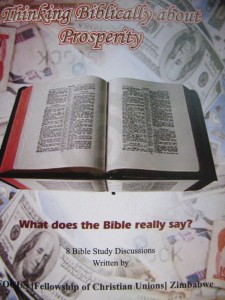(written by Mukululi Ncube, staff member of FOCUS Zimbabwe)
“Your father has a thousand cattle on the hill; you can’t be poor! You are not cursed but blessed. The blessings of Abraham are yours. Poverty is a curse; so is sickness and all forms of disease. Come to Jesus and today receive your blessings.”
Such statements dominate church preaching in Zimbabwe. This “prosperity gospel” has affected us strongly. Churches have lost significant membership to those churches that preach the prosperity gospel. In FOCUS, we also have seen a large number of students drawn to these churches.
Why are our students so attracted to this preaching? One of the main reasons is that Zimbabwe has gone through unprecedented economic meltdown in the past two decades, leaving a lot of people with desperate financial problems. Job prospects are bleak. And so this brand of gospel which promises employment and instant success draws our students into a false sense of security. A lack of good teaching makes our students gullible to these attractively packaged, yet false teachings.
What has been our response to this reality? Our initial response was to engage in outright confrontation. But this tended to chase away those who would have benefited from such expositions.
Having noticed the limitations of our first response, we decided to engage the students in Bible study. A study encourages them to discover the answers in God’s Word as opposed to those truths being forced down their throats! It invites them to ask their questions about poverty, about blessings and curses, about hunger and starvation, disease and joblessness, etc. In order to engage the students, we needed to affirm that the Bible teaches about prosperity. And so we decided to develop a Bible study guide on the topic.
We started by asking each student group to note the passages which speakers used to teach on prosperity. As expected, most of them were Old Testament passages into which the speakers read their own thoughts. As a staff team, we went through the list and selected one passage from each of the following sections of Scripture: Law, Old Testament narrative, Wisdom literature, Prophets, Gospels, Acts, Epistles and Revelation.
 Each staff member committed to studying one of the passages together with others. We then met for a weekend with selected Bible study leaders and trained them on how to write a Bible study guide. Another month was devoted to more study before we set aside a week to sharpen our Bible studies. The result was our Bible study guide: Thinking Biblically About Prosperity.
Each staff member committed to studying one of the passages together with others. We then met for a weekend with selected Bible study leaders and trained them on how to write a Bible study guide. Another month was devoted to more study before we set aside a week to sharpen our Bible studies. The result was our Bible study guide: Thinking Biblically About Prosperity.
This study guide has made space for the Bible to speak for itself on the subject of prosperity. We hope that once the Bible is given center stage, then God will reveal his message on how we are to view material wealth and physical well-being.
Mukululi Ncube
mukululi (at) yahoo.co.uk

